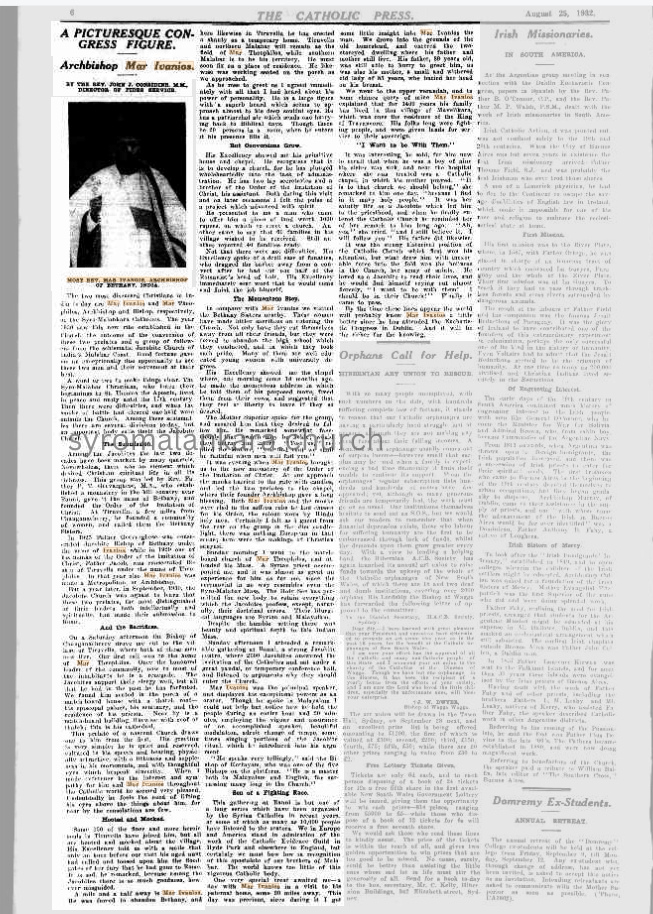By the Rev. John J. Considine, M.M., Director of FIDES Service
Most Reverend Mar Ivanios, Archbishop of Bethany, India
The two most discussed Christians in India today are Mar Ivanios and Mar Theophilos, Archbishop and Bishop, respectively, of the Syro-Malankara Catholics. The year 1930 saw this new rite established in the Church, the outcome of the conversion of these two prelates and a group of followers from the schismatic Jacobite Church of India’s Malabar Coast. Good fortune gave me an exceptionally fine opportunity to see these two men and their movement at their best.
A word or two to make things clear. The Syro-Malabar Christians, who trace their beginnings to St. Thomas the Apostle, lived in peace and unity until the 17th century. Then there were difficulties, and when the smoke of battle had cleared one-half were outside the Church. Among these schismatics there are several divisions today, but an important body calls itself the Jacobite Church.
The Submission
Among the Jacobites the last two decades have been marked by many quarrels. Nevertheless, there was an element which desired Christian spiritual life in all its richness. This group was led by Rev. Father P. T. Geevarghese, M.A., who established a monastery in the hill country near Ranni, gave it the name of Bethany, and founded the Order of the Imitation of Christ. At Tiruvella, a few miles from Changanacherry, he founded a community of women, and called them the Bethany Sisters.
In 1925 Father Geevarghese was consecrated Jacobite Bishop of Bethany under the name of Ivanios, while in 1929 one of his monks of the Order of the Imitation of Christ, Father Jacob, was consecrated Bishop of Tiruvella under the name of Theophilos. In that year also Mar Ivanios was made a Metropolitan, or Archbishop.
But a year later, in September 1930, the Jacobite Church was aghast to learn that these two prelates, the most distinguished of their leaders both intellectually and spiritually, had made their submission to Rome.
And the Sacrifices
On a Saturday afternoon the Bishop of Changanacherry drove me out to the village of Tiruvella, where both of these men now live. Our first call was to the home of Mar Theophilos. Once the honored leader of the community, now to most of the inhabitants he is a renegade. The Jacobites support their clergy well, but all that he had in the past he has forfeited.
We found him seated in the porch of a match-board house with a thatch roof — his episcopal palace, his seminary, and the residence of his priests. Nearby is a match-board building, likewise with a roof of thatch; this is his cathedral.
This prelate of a nascent Church draws one to him from the first. His greeting is very simple; he is quiet and reserved, cultured in his speech and bearing, physically attractive, with a litheness and suppleness in his movements, and with thoughtful eyes which bespeak sincerity. When I made reference to the interest and sympathy for him and Mar Ivanios throughout the Catholic world he seemed very pleased. Undoubtedly, he feels the need of lifting his eyes above the things about him, for nearby the consolations are few.
Hooted and Mocked
Some 150 of the finer and more heroic souls in Tiruvella have joined him, but all are hooted and mocked about the village. His Excellency told us with a smile that only an hour before our visit his aged aunt had called and loosed upon him the floodgates of her fury that he had gone to Rome. It is sad, he remarked, because among the Jacobites there is so much goodness, however misguided.
A mile and a half away is Mar Ivanios. He was forced to abandon Bethany, and here likewise in Tiruvella he has erected a shanty as a temporary home. Tiruvella and northern Malabar will remain as the field of Mar Theophilos, while southern Malabar is to be his territory. He must soon fix on a place of residence. He likewise was working seated on the porch as we approached.
As he rose to greet us I agreed immediately with all that I had heard about his power of personality. He is a large figure with a superb beard which seems to approach almost to his deep soulful eyes. He has a patriarchal air which sends one hurrying back to Biblical days. Though there be 20 persons in a room, when he enters it his presence fills it.
But Conversions Grow
His Excellency showed me his primitive house and chapel. He recognizes that it is to develop a church, for he has plunged wholeheartedly into the task of administration. He has two lay secretaries and a brother of the Order of the Imitation of Christ, his assistant. Both during this visit and on later occasions, I felt the pulse of a project which advanced with spirit.
He presented to me a man who came to offer him a piece of land worth 1000 rupees, on which to erect a church. Another came to say that 60 families in his village wished to be received. Still another reported 40 families ready.
Not that there were not difficulties. His Excellency spoke of a droll case of fanatics, who dragged the barber away from a convert after he had cut one half of the Romanist’s head of hair. His Excellency immediately sent word that he would come and finish the job himself.
The Momentous Step
In company with Mar Ivanios, we visited the Bethany Sisters nearby. These women have made bitter sacrifices on entering the Church. Not only have they cut themselves away from all their friends, but they were forced to abandon the high school which they conducted, and in which they took such pride. Many of them are well-educated young women with university degrees.
His Excellency showed me the chapel there, one morning some 18 months ago, he made the momentous address in which he told them of his proposed move, freed them from their vows, and suggested that they feel at liberty to leave if they so desired.
The Mother Superior spoke for the group, and assured him that they desired to follow him. He remarked somewhat facetiously that women may be fickle; would they betray him later? ‘Test us,’ replied the Mother, ‘you find that we shall be faithful when men will fail you.’
It was evening when Mar Ivanios brought us to the new monastery of the Order of the Imitation of Christ. At our approach the monks hurried to the gate with candles, and led the two prelates to the chapel, where their founder-Archbishop gave a long blessing. Both Mar Ivanios and the monks were clad in the saffron robe he had chosen for his Order, the color worn by Hindu holy men. Certainly, I felt as I gazed from the rear on the group in the dim candlelight, there was nothing European in that scene; here were the makings of Christian sanyasi.
Sunday morning I went to the matchboard church of Mar Theophilos, and attended his Mass. A Syrian priest accompanied me, and it was almost as great an experience for him as for me, since the ceremonial in no way resembles even the Syro-Malabar Mass. The Holy See has permitted the new body to retain everything which the Jacobites profess, except, naturally, their doctrinal errors. Their liturgical languages are Syrian and Malayalam.
Despite the humble setting, there was beauty and spiritual depth to this Indian Mass.
Sunday afternoon I attended a remarkable gathering at Ranni, a strong Jacobite center, where 2000 Jacobites answered the invitation of the Catholics and sat under a great pandal, or temporary conference hall, and listened to arguments why they should enter the Church.
Mar Ivanios was the principal speaker and displayed his exceptional powers as an orator. Though he spoke in Malayalam, I could not help but notice how he held the people during an entire hour and 20 minutes, employing the vigor and assurance of an accomplished speaker, beautiful modulation, adroit change of tempo, sometimes singing portions of the Jacobite ritual, which he introduced into his argument.
‘He speaks very tellingly,’ said the Bishop of Kottayam, who was one of the five Bishops on the platform. ‘He is a master both in Malayalam and English, far surpassing many long in the Church.’
Son of a Fighting Race
This gathering at Ranni is but one of a long series which have been organized by the Syrian Catholics in recent years, at some of which as many as 10,000 people have listened to the orators. We in Europe and America stand in admiration of the work of the Catholic Evidence Guild in Hyde Park and elsewhere in England, but certainly we must bow low in recognition of this apostolate of our brothers of Malabar. The world knows too little of this vigorous Catholic body.
One very special treat awaited me — a day with Mar Ivanios in a visit to his paternal home, some 20 miles away. This day was precious, since during it I got some little insight into Mar Ivanios the man. We drove into the grounds of the old homestead, and entered the two-storied dwelling where his father and mother still live. His father, 89 years old, was still able to hurry to greet him, as was also his mother, a small and withered old lady of 85 years, who buried her head on his breast.
We went to the upper verandah, and to some chance query of mine Mar Ivanios explained that for 1400 years his family has lived in this village of Mavelikara, which was once the residence of the King of Travancore. His folks long were fighting people and were given lands for service to their sovereign.
‘It was interesting,’ he said, ‘for me now to recall that when I was a boy of nine his sister was sick, and near the hospital where she was treated was a Catholic chapel, in which his mother prayed. ‘It is to that church we should belong,’ she remarked to him one day, ‘because I find in it many holy people.’ It was her saintly life as a Jacobite which led him to the priesthood; and when he finally entered the Catholic Church he reminded her of her remark to him long ago. ‘Ah, yes,’ she cried, ‘and I still believe it. I will follow you.’ His father did likewise.
It was the strong historical position of the Catholic Church which first won his attention, but what drew him with inexorable force into the fold was the holiness in the Church, her army of saints. He loved as a Jacobite to read their lives, and he would find himself crying out almost fiercely, ‘I want to be with them! I should be in their Church!’ Finally, it came to pass.
By the time these lines appear, the world will probably know Mar Ivanios a little better since he has attended the Eucharistic Congress in Dublin. And it will be the richer for the knowing.
Copyright: The Catholic Press. 25th August. 1932


